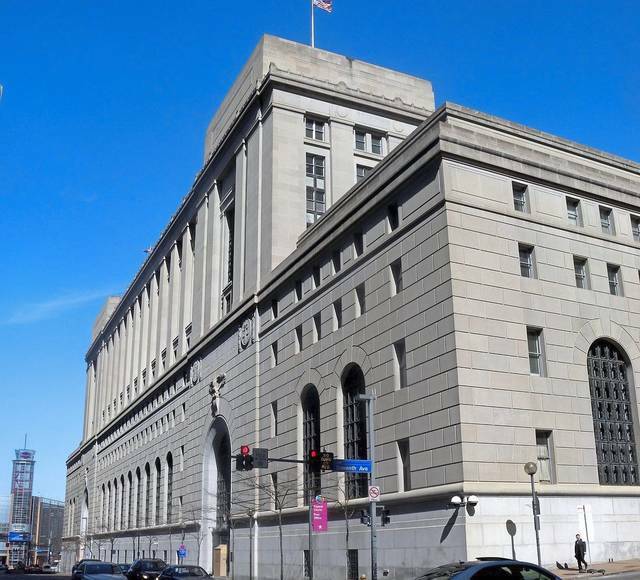The federal judge who presided over the trial of the man who killed 11 people at a Pittsburgh synagogue has permanently sealed the names of the jurors who convicted him.
U.S. District Judge Robert J. Colville initially sealed the names and addresses of the jurors and prospective jurors during jury selection in May to continue through at least the verdict in the case.
Less than three weeks later, he made the sealing order permanent. However, like many of the documents filed in the case, that order remained off limits publicly until last week.
Robert Bowers, 50, of Baldwin, was found guilty of all 63 counts against him on June 16 by a jury of seven women and five men. That same panel voted in favor of the death penalty, and the formal sentence was imposed by Colville on Aug. 3.
In the worst antisemitic attack in U.S. history, Bowers killed Rose Mallinger, 97; Bernice Simon, 84, and her husband, Sylvan Simon, 86; brothers David Rosenthal, 54, and Cecil Rosenthal, 59; Dan Stein, 71; Irving Younger, 69; Dr. Jerry Rabinowitz, 66; Joyce Fienberg, 75; Melvin Wax, 87; and Richard Gottfried, 65.
The victims were members of the Tree of Life-Or L’Simcha, Dor Hadash and New Light congregations, all of which worshipped at the Tree of Life synagogue in Squirrel Hill.
In May, defense attorneys had filed a motion seeking to have the names and addresses of the jurors sealed at least until a verdict was entered in the case. Colville granted the request.
“The court will not belabor the point in this case, as it feels that the reasons for, at the least, delaying disclosure of juror names until the end of trial in this matter are myriad and apparent,” he wrote.
In findings filed on the docket under seal on the same day — and unsealed last week — Colville wrote that media attention in the case had been persistent and consistent, and that juror candor and impartiality were of paramount importance.
“This case has the potential to invite allusions and/or direct references to white supremacy, racism and antisemitism, among other ‘hot button’ topics that might invite untoward juror contact,” he wrote. “This is especially so given the prevalence of social media and the potential ease with which individuals, and particularly those with strong views of this case and the nature of the crimes at issue, could contact jurors in this high-profile case. Accordingly, for these reasons, the court finds that the presumption of openness is overcome.”
Then on June 6, while the guilt phase of the trial was still underway, Colville entered an order holding “that it is in the interests of justice that the names of jurors and potential jurors remain permanently sealed.”
It references a filing by the U.S. Attorney’s office made on June 2, but it also is sealed.
Colville’s order says the government’s filing “confirms the court’s concerns … and speaks to an internet-user’s desire to identify and influence jurors and also a desire to know their identities after the guilt phase of the trial.”
First Amendment advocates were critical of Colville’s decision to permanently seal the jurors’ names, arguing that secrecy in the courts raises questions about credibility.
“It’s a troubling trend because courts are very deferential to these issues of privacy,” said Gregg Leslie, executive director of the First Amendment Clinic at Arizona State University.
“We need accountability,” he said. “I think we need more openness, and there’s a good reason for that. In the end, I think (a lack of openness) really undermines the credibility in the justice system.”
Openness, Leslie said, helps quell concerns in the community about juries being stacked in favor of one side or the other and also helps to quiet allegations of conspiracy.
“You need confidence to know these jurors were picked from the community,” he said.
When journalists are able to interview jurors, Leslie continued, it also helps the community understand the verdict — particularly in a capital case.
“The higher the profile, the more the public is discussing it, the more you need openness and accountability,” Leslie said.
Relative to potential threats, he said that those can be monitored or addressed when they happen — and with less drastic means than sealing the entire jury list.
Melissa Melewsky, media law counsel with the Pennsylvania NewsMedia Association, said a sealing order should not be based on speculation.
“Obviously, nobody wants to see a juror subjected to threats, harassment or anything like that,” she said. “That would be awful.”
But she said there has to be a careful balancing, and the legal standard for sealing the records is high.
Melewsky said doing so requires a compelling reason and the court must show that the action being taken is the least restrictive means available to accomplish its goal, and that it is narrowly tailored to fit the situation specifically.
Jury lists have always been public, but in recent years, as there are fewer journalists challenging decisions to seal names, the practice has become more widespread.
“What juries do is very difficult,” Melewsky said. “But that doesn’t mean that confidentiality is the solution. It all goes back to confidence in the judicial system itself.”
Saint Vincent College law professor Bruce Antkowiak said he thinks Colville’s sealing order could be upheld by the 3rd U.S. Circuit Court of Appeals if challenged.
“I think there may be a very legitimate concern that people could retaliate against them,” he said.
He cited the arrest last week of noted white supremacist Hardy Lloyd, who was charged with threatening Jews and targeting witnesses and jurors during the Bowers trial.
Antkowiak suggested that it might make sense for the court to let the dust settle and then revisit the sealing issue in the future.
In the meantime, he said there’s nothing stopping jurors from speaking publicly if they choose to.
“Jurors could reach out to reporters if they wanted,” Antkowiak said. “There’s nothing to prevent that from happening.”








